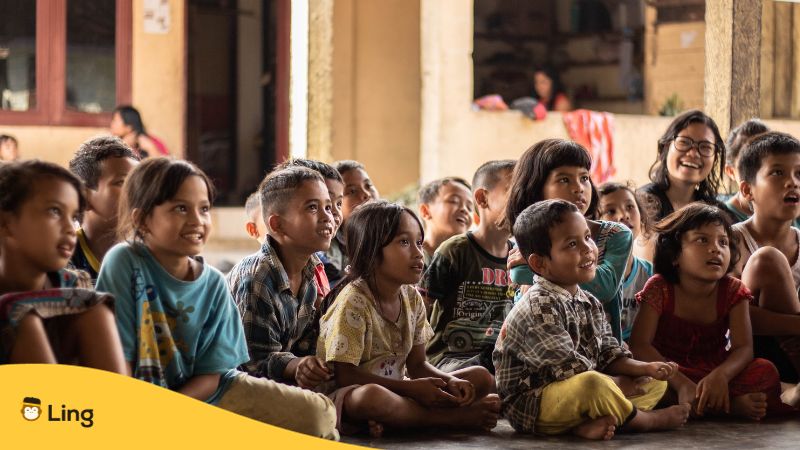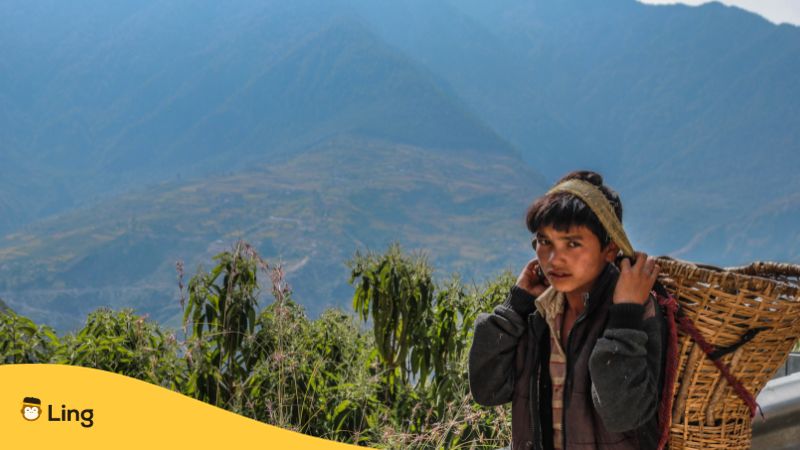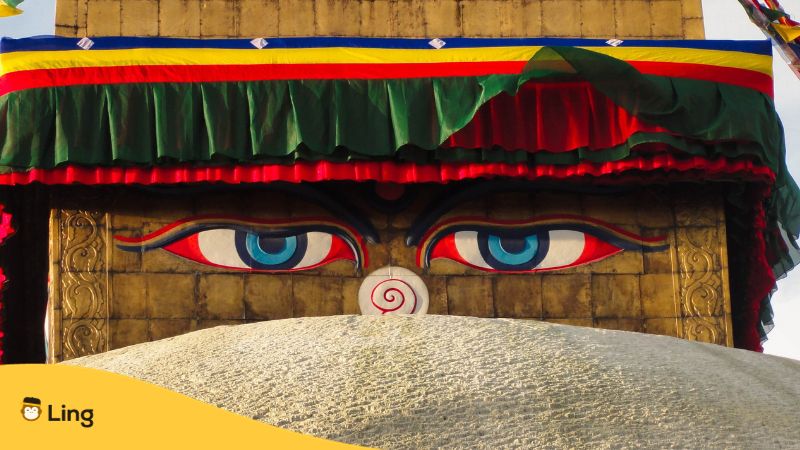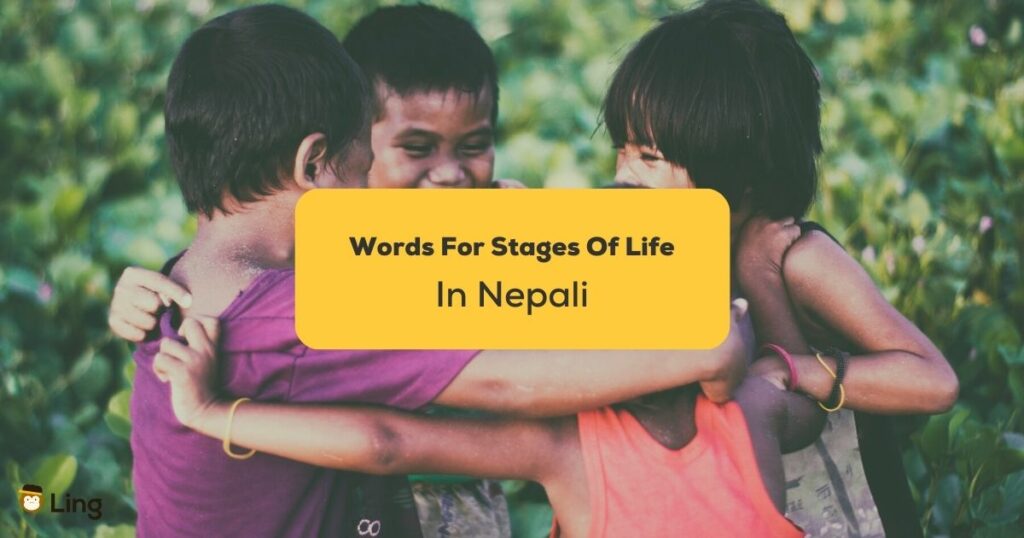Namaste! Welcome to our language learning journey as we delve into the stages of life in Nepali culture. Understanding these key phases is not only vital for language learners but also provides insights into the culture of native speakers if you ever visit Nepal. In this blog post, we’ll explore Nepali words for different stages in life, such as childhood, adolescence, and adulthood, while sprinkling in some other essential vocabulary along the way.
Nepali Words For Stages In Life
1. Childhood – बालबालिका (Bāla/Bālibālika)
In Nepali, “childhood” is referred to as “बालबालिका,” which can be broken down into two parts. “बाल” (Bāla) translates to “child,” while “बालिका” (Bālibālika) means “girl” or “young woman.” This word signifies the early years of a person’s life when they are still considered a child.
2. Adolescence – किशोरावस्था (Kishorāvasthā)

“Adolescence” in Nepali is known as “किशोरावस्था,” where “किशोर” (Kishor) means “youth” or “adolescent,” and “अवस्था” (Avasthā) refers to “stage” or “phase.” This phase marks the transition from childhood to adulthood, characterized by rapid physical and emotional changes.
3. Adulthood – प्रौढावस्था (Praudhāvasthā)
As Nepali learners progress through life stages, they’ll encounter “प्रौढावस्था,” which means “adulthood.” “प्रौढ” (Praudh) stands for “adult,” and “अवस्था” (Avasthā) still denotes “stage” or “phase.” It signifies the period when individuals assume responsibilities and independence.
Now, let’s sprinkle in some more Nepali vocabulary related to life stages (with the English language translation):
- जन्म (Janma) – This Nepali word means “birth” in Nepali. It’s an essential term when discussing the beginning of life.
- विद्यालय (Vidyālaya) – “Vidyālaya” translates to “school” or “educational institution.” Education plays a significant role in a Nepali child’s life.
- शिक्षा (Shikshā) – “Shikshā” has the Nepali meaning of “education.” Education is highly valued in Nepali culture.
- विवाह (Vivāha) – When it’s time to talk about marriage, you’ll need this word. “विवाह” (Vivāha) signifies the union of two individuals in marriage.

- परिवार (Parivāra) – “परिवार” (Parivāra) means “family” in Nepali. It’s essential when discussing family life.
- रोजगार (Rojgāra) – In adulthood, discussions about “रोजगार” (Rojgāra), or “employment,” become more prominent.
- विभाग (Vibhāga) – As life progresses, individuals may experience “विभाग” (Vibhāga) or “division” of responsibilities, such as within a family or workplace.
Nepal’s culture is deeply rooted in traditions and values that influence these stages of life. Learning the language opens doors to understanding and appreciating the diverse experiences of Nepali people as they journey from childhood to adulthood.
Check out useful Nepali verbs & important conversational phrases in Nepali for more language learning fun!
Important Rituals In Nepali Culture Across Life Stages

Nepal is a land of diverse cultures, and its rich history of traditions is deeply intertwined with the various stages of life. Here, we’ll explore some of the most significant rituals and customs unique to this region at different life stages.
1. Birth and Naming Ceremony (नामकरण पर्व – Naamkaran Parva)
The birth of a child is a momentous occasion in Nepali life stages. Shortly after a baby is born, the family gathers for the naming ceremony, known as “नामकरण पर्व” (Naamkaran Parva).
During this ritual, a priest or family elder selects a name for the newborn based on astrological and cultural considerations. It is believed that the chosen name will influence the child’s life. The ceremony is often accompanied by prayers, blessings, and the sharing of sweets and gifts among family and friends.
2. Bratabandha (ब्रतबन्ध)
As Nepali boys transition into adolescence, they undergo a significant rite of passage known as “ब्रतबन्ध” (Bratabandha). Typically performed between the ages of 9 to 13, this ceremony marks the beginning of a boy’s formal education in Hinduism. During Bratabandha, a priest conducts rituals and ties a sacred thread (janai) around the boy’s wrist, symbolizing his commitment to spiritual and moral values.
3. Marriage (विवाह – Vivaha)
Marriage is one of the most elaborate and cherished customs in Nepali culture. The wedding ceremony, or “विवाह” (Vivaha), is a grand affair that varies among different ethnic groups in Nepal. Common elements include the exchange of garlands, applying tika (a red mark) on the bride’s forehead, and walking around a sacred fire seven times, symbolizing their eternal commitment.
4. Pasni (पस्नी)
For young Nepali children, especially girls, the “पस्नी” (Pasni) ceremony is a significant milestone. Pasni is the rice-feeding ceremony that typically occurs between the child’s fifth and seventh months. During this ritual, the child is introduced to solid food, primarily rice pudding, symbolizing their transition to a more adult diet. Family and friends gather to bless the child, and it is a joyous occasion filled with traditions and cultural significance.
5. Antyesti (अन्त्येष्टि)
Finally, when the journey of life reaches its natural conclusion, Nepali culture observes the “अन्त्येष्टि” (Antyesti) or funeral rites. The rituals surrounding death vary among different communities in Nepal, but they often involve cremation, prayers, and a period of mourning. The ashes of the deceased are typically scattered in a sacred river, symbolizing the cycle of life and rebirth in Hindu beliefs.
These rituals highlight the profound connection between the people of Nepal and their cultural traditions at each stage of life. Whether celebrating the joy of birth, guiding youth into adulthood, or marking the end of a life well-lived, these customs showcase the beauty and diversity of Nepali culture.

As you continue your Nepali language learning adventure, keep in mind that these words are just the tip of the iceberg. Embrace the beauty of the Nepali language and its reflection of a vibrant culture filled with diverse life experiences. Happy learning, or as they say in Nepali words, “शुभ पढाइ” (Shubha Padhāi)!
Learn Nepali With Ling
Want to learn more Nepali but don’t know where to find resources on this niche language? Download the free Ling app today from the App Store and Play Store.
It is a highly researched language-learning app for a fun and personalized experience. With Ling, you’ll smash your language goals with a little hard work and practice. Aside from Nepali speakers, there are over 60+ foreign languages to learn on Ling. Download it today!



































































